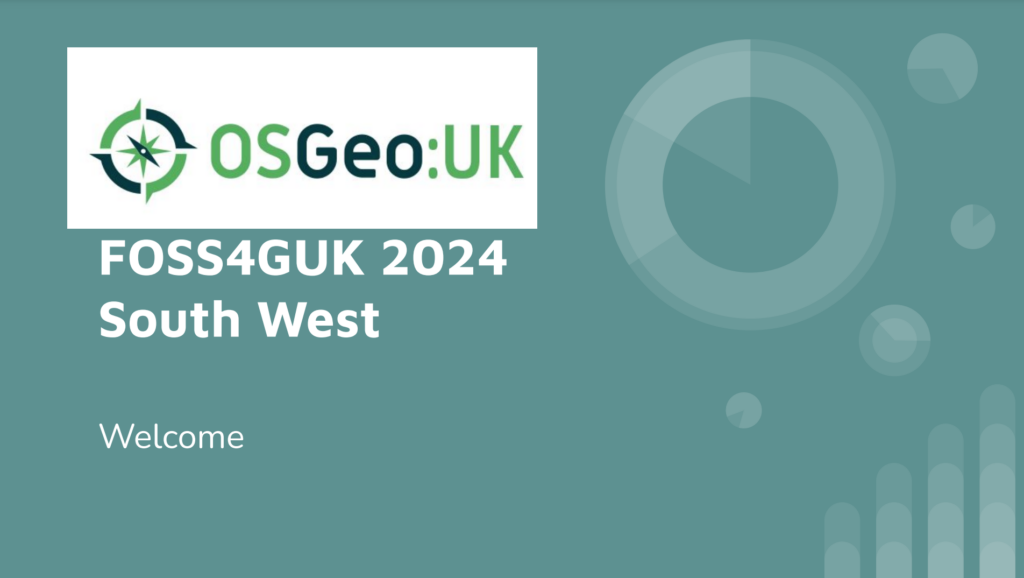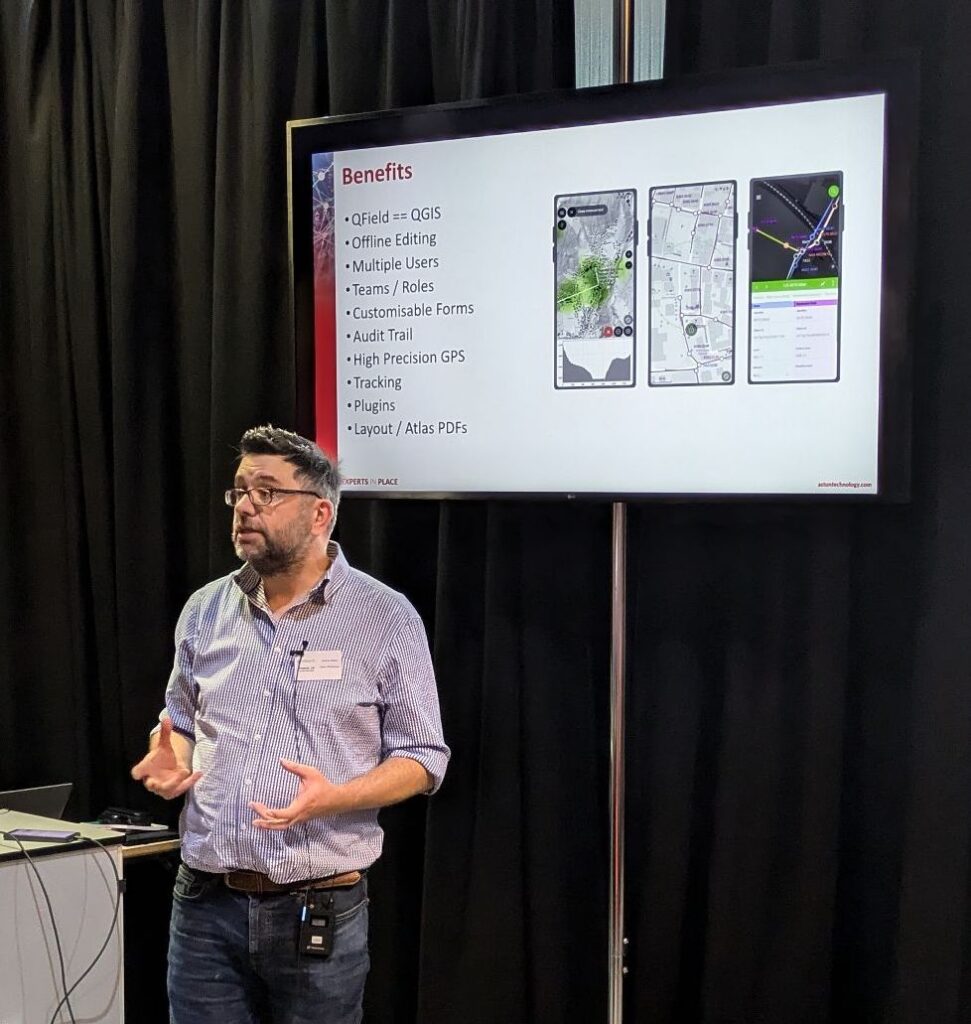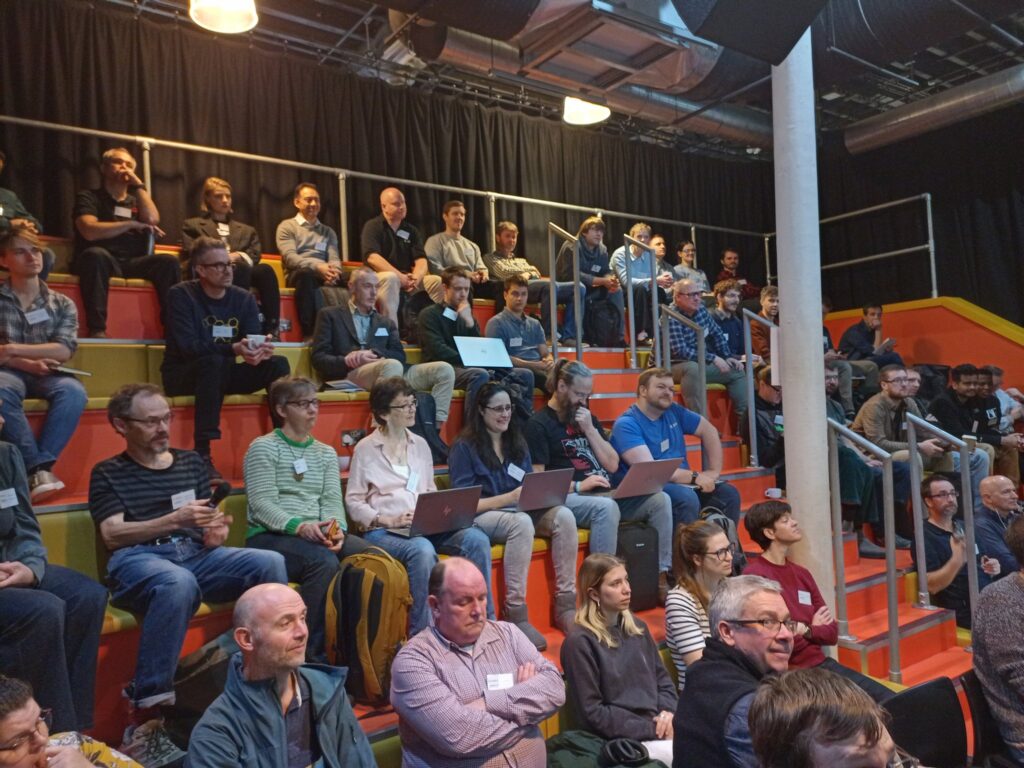
GIS events are definitely like buses. Nothing comes along for months and then suddenly you have a calendar packed full of worthwhile days out. That’s happened this November, as we have three PSGA conferences and our User Group on the schedule. However, busy as we are, nothing was going to keep us from showing our support for FOSS4G:UK’s event in Bristol on November 12th.
In addition to sponsoring the event, we were keen to send team members so they could immerse themselves in the latest open source technologies and applications. This year’s packed agenda – featuring a whopping 14 talks – offered something for everyone. In this blog, Ali (Professional Services Manager), Andrew (Senior GIS Consultant) and Elena (Data Services Engineer) share their ‘best bits’.
“Satellites for Digitalization Of Railways” (Alison Hopkin)
We can’t think of a better opening topic for this year’s FOSS4G:UK South West, held in Brunel’s Engine Shed in Bristol, than this European Space Agency project. Alison’s talk was a big hit with Elena, who can’t wait to have better internet on trains, and Ali, who is prone to experiencing wanderlust. She comments:
“Everyone could relate to Alison Hopkin’s talk about attempts to improve the WiFi and connectivity when travelling by train – having all just had various WiFi experiences whilst travelling to the event, we await the results with bated breath! The project is called ‘SODOR’ (Satellites for Digitalisation of Railways), a name which resonated with anyone brought up on Thomas the Tank Engine.”
Ali, Professional Services Manager
“Start the Overture” (Al Graham)
Overture provides free and open map data normalised to a common schema. Its six data “themes” — addresses, buildings, base, divisions, places, and transportation — already contain over 3.7 billion features. Our data guru, Elena, was delighted to learn about many potentially useful datasets available under mostly open licences.
“Unlocking the power of Overture Maps with DuckDB Spatial” (Matt Travis)
Past Astuner Matt explained how to remotely query Overture data using DuckDB and visualise spatial data interactively. His demonstration drew comments of “Wow, that was quick” from the audience.
“Geo-spatial data analysis for heritage & habitat” (David Lovelace)
Ali comments, “David Lovelace’s presentation on the analysis of historic and contemporary maps to unlock the history of woodland and pasture in parts of Herefordshire was fascinating, as he showed how areas of land and their use could be traced from original Tithe Maps right up to present day.”
Elena adds:
“It was pretty mind-blowing to see what can be achieved with an old Android phone and a bit of QGIS.”
Elena, Data Services Engineer
For those of us who remember the ‘old’ phones as cutting-edge, the less said the better.

“QField in an enterprise setting” (Andy Bailey)
Astuner Andy wasn’t cheeky enough to nominate his talk, but Ali was happy to do it for him. Fresh from his successful presentation at our User Group, which saw delegates happily using QField to log features, Andy took to the stage to talk about capturing field data using QField and adjusting QGIS projects to make them as friendly as possible for mobile data capture.
“Real-Time Vessel Monitoring with Open-Source Tools: Leveraging PostgreSQL, PostGIS, and Python for Geospatial Analysis and Visualisation” (Rob Burgess)
This talk may not have had the catchiest title in the world but its content appealed greatly to Ali. Rob showed how various kinds of vessels were tracked between buoys, travelling on the open seas, FPSOs (Floating Production Storage & Offloading), drilling platforms and when they were back at the dock. Who knew that Ali’s love of travelling would take such a nautical bent?
“Using cloud-native geospatial technologies to build a web app for analysing and reducing flood risk” (Robin Wilson)
Robin is working with Rebalance Earth, the first UK boutique asset manager entirely focused on Nature as an investable asset. The company plans to restore Nature at a landscape and seascape level to deliver vital ecosystem services to companies, communities and cities.
During his talk, Robin outlined strategies for analysing and reducing flood risk. Ali was particularly interested in the concept of ‘Nature as a Service – NaaS’. This sees Rebalance Earth design restoration schemes that reduce the risk of businesses flooding, with the cost borne by the companies themselves.
“Creating a grid layout plugin for QGIS” (Alexei Schwab)
This show and tell about how Alexei found developing a QGIS plugin for the first time has inspired Andy Bailey to dig out his QGIS plugin work from seven years ago and submit it.
As you can see, the feedback from the team was overwhelmingly positive. We’d like to extend our thanks to the organisers and speakers for putting on such a well-thought-out event.

